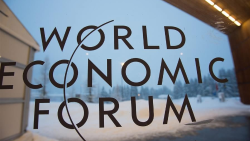
Editor's note: Stephen Ndegwa is a Nairobi-based communication expert, lecturer-scholar at the United States International University-Africa, author and international affairs columnist. The article reflects the author's opinions and not necessarily the views of CGTN.
Hundreds of global leaders in various fields are participating in the 51st World Economic Forum (WEF), which is being held virtually for obvious reasons. Delegates in the Davos conference which was launched on January 25 in Switzerland are tackling global issues centered on seven main WEF themes, namely, saving the planet, fairer economies, tech for good, society and future of work, better business, healthy futures and beyond geopolitics.
The theme for this year's event is "The Great Reset," which resonates with "Build Back Better," a slogan coined and used by U.S. President Joe Biden's campaign team in the run-up to the 2020 presidential elections. The aim here is the need to rethink the current trajectory that the world's socio-economic and political order has taken before we all come crashing down. It is a reality that the coronavirus pandemic has shown is easy to happen.
Clearly, the world cannot continue with business-as-usual as if the current crisis does not need a paradigm shift. There is a danger that WEF 2021 could fall into a trap, a routine or annual ritual that, echoing the words of Mohamed A. El-Erian, chief economic adviser at Allianz in a CGTN opinion on February of last year wrote, "participants ended up extrapolating more from the recent past than genuinely looking into the future for pivots and tipping points."
The same sentiments were shared in an opinion carried by The Conversation on January 22 which posited that, to achieve a "great reset",,we can't count on the same old globalists to lead the way.
Predictably, COVID-19 is the major issue on the table, for the simple reason that the pandemic almost stalled all types of business in 2020. Things are in disarray in most countries globally. There would be no much panic if the pandemic was not a compounding factor of mounting global challenges including climate change, cross-border insecurity and financial crisis. Moreover, experts warn that COVID-19 could be just one in a string of devastating pandemics hovering over mankind.
The august group of eminent persons participating in WEF 2021 should honestly pose to themselves the question whether the world has been heading in the right direction under their watch, and whether they should not propose a change of course where appropriate. We really do not require a new world order. What we may need is a different course that is more empathetic and inclusive.
The reset that the world needs is more of a mental rather than a structural recalibration. Different structures under the same old mentalities where the winner-takes-it-all is no longer tenable, having bred unsustainable inequalities. It is a rethink that is happening in-country in some regions.

China's first approved COVID-19 vaccine for public use. /CFP
China's first approved COVID-19 vaccine for public use. /CFP
In Kenya, for instance, President Uhuru Kenyatta is currently pushing for a national referendum that seeks to unite the country through an approach dubbed the Building Bridges Initiative (BBI). If citizens vouch for this framework during a national referendum planned for later this year, the BBI is expected to create non-polarizing presidential elections which have previously led to wanton bloodshed between different ethnic groups. It will also level the playing field for Kenyans seeking various opportunities.
On a global scale, this is a concept that can be replicated in a way that global interactions create win-win outcomes rather than result in zero-sum contestations. This point was stressed by Chinese President Xi Jinping during his speech to WEF 2021 on Monday via video link: "Equal rights, equal opportunities and equal rules should be strengthened so that all countries will benefit from the opportunities and fruits of development."
We can start by ensuring that COVID-19 vaccines are available to all and sundry as a public good. This need is, of course, carries urgency in the developing world where majority of the countries are not only unable to develop their own vaccines, but also cannot afford to buy the massive stocks needed for their vast populations at market prices.
The WEF should reset its main agenda to bridging the wide gap between the haves and the have-nots, the rich and the poor, the developed and the developing. There are critical areas that can help to achieve this, top of which is technology. Like other public utilities, digital technologies should be treated as a public good and made available across the social and economic spectrum.
The world does not to need more heroes, or to re-invent the wheel in order to address the insurmountable challenges. The way we collectively handle the COVID-19 response will be an indication whether we are ready to leave our prevailing discriminative tendencies across various divides and isms.
No one knows it all. It is only through synergy that we can save the life on earth from its myriad problems and sustain it for progeny in the coming millennia.
(If you want to contribute and have specific expertise, please contact us at opinions@cgtn.com.)

